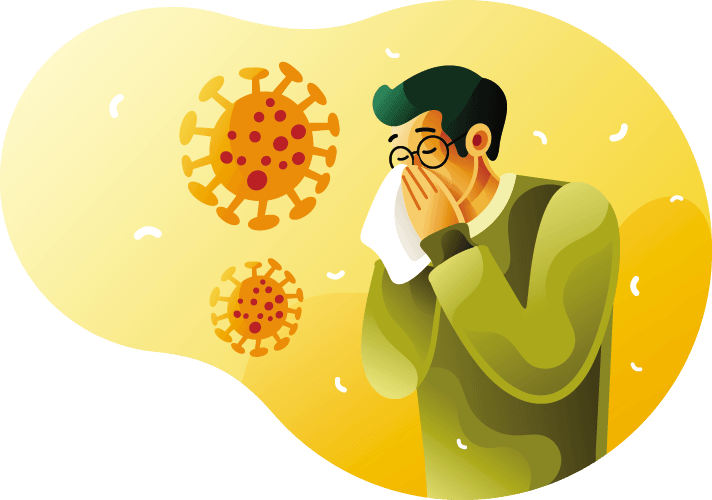Covid-19 (Coronavirus) vs Allergies

As we all know, 2020 and half of 2021 has been a time unlike any other due to the unprecedented circumstances brought about by the COVID-19 pandemic.
In the past fortnight we have notice a huge surge in hay fever sufferers and unlike other years those who have not had symptoms before. Perhaps not being exposed to allergens over the past year by lack of social interaction and mask wearing may be leading to the spike this year.
To avoid any unnecessary anxiety, it’s important to know the difference between hay fever and coronavirus, and the symptoms that can be caused by the respective conditions, particularly in those suffering hay fever for the first time.
Hay fever sufferers will often present with red, itchy, watery eyes, while COVID-19 does not result in eye-related symptoms.
Sinus pain, pressure and congestion are all symptoms associated with hay fever, but have not been reported among COVID-19 patients.
As a side effect of the allergic reaction that produces hay fever symptoms, sufferers may notice flare-up in pre-existing eczema or other rashes or hives. Coronavirus, meanwhile, does not irritate the skin.
A range of antihistamine products are available over the counter from all pharmacies to treat the symptoms associated with hay fever, and stronger medication can be prescribed by your GP.
As we approach hay fever season, we would like to remind you that allergic rhinitis (hay fever) has symptoms including a runny nose, blocked nose, cough, and sneezing. In some people, hay fever can trigger allergic asthma, causing a tight chest and difficulty breathing.
So be prepared with your anti-allergy medication, which often includes antihistamines, nasal saline douching, allergen barrier balm and nasal steroid spray. If you have allergic asthma, it is important to take your preventative inhaler regularly as prescribed and have a rescue inhaler with you at all times.
Prepare in advance – make sure that you have adequate medication and don’t leave it to the last minute to get repeat prescriptions.
Do not mistake hay fever symptoms for coronavirus. The symptoms of coronavirus are a high temperature and a new, continuous cough. Hay fever does not cause a high temperature and most people with hay fever do not feel unwell. Mild to moderate hay fever is easily treated.
- I understand that allergy is a disease of the auto immune system. Does that mean that having an allergy makes you more vulnerable?
Allergy is not an autoimmune disease. Allergy is a result of an exaggerated immune response to an allergen, e.g. a particular food or pollen. Our immune system is our defense mechanism and it is there to respond to things like viruses and bacteria to defend ourselves. Do not confuse allergy, and the exaggerated immune response to an allergen, with the body being unable to mount an immune response to a virus or bacteria.
Do anti-allergy medications have a negative effect on immunity?
Most anti-allergy medications do not affect immunity, but it does depend on the medication. Medication such as antihistamines and Montelukast are generally considered safe so you should continue to use these. To the best of our knowledge, there is no reason to think that antihistamines would lower the immune response. Inhaled and nasal steroids are also generally considered safe as they only target the nose or the lungs to reduce any inflammation and reduce their hypersensitivity. However, oral steroids and other immunosuppressive tablets could adversely influence immunity and a healthcare professional will need to carry out a risk-benefit evaluation, so you should seek advice from your GP or specialist for further advice on this.- If I have asthma/allergies and I have been in contact with someone who has tested positive for covid-19 should I stop medication?
Our experts strongly advise that you should not stop your medication. If your asthma gets worse then follow medical advice. Well-controlled asthmatic patients are not believed to be under significant risk and patients should continue using their anti-asthma medications. - Can I keep using steroid nasal sprays?
The advice here is that you can continue using your nasal spray. Nasal steroid sprays only target the nasal area and are only minimally absorbed and rarely into the systemic circulation. As a nasal steroid spray it acts by reducing inflammation of the nasal lining, so effectively it reduces the immune response in the nose, not the whole body. One thing that is also worth considering is a nasal saline douche or allergen barrier balm to be used in the hay fever season. These you can get over the chemist counter along with advice on how to use these.
- I understand that allergy is a disease of the auto immune system. Does that mean that having an allergy makes you more vulnerable?
